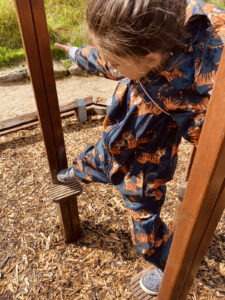 At its simplest, praxis is knowing what to do, and figuring out how to do it (Jean Ayres). We need praxis skills as children and as adults. If we have difficulties with praxis skills, we might call this ‘dyspraxia’.
At its simplest, praxis is knowing what to do, and figuring out how to do it (Jean Ayres). We need praxis skills as children and as adults. If we have difficulties with praxis skills, we might call this ‘dyspraxia’.
Sometimes children might have a formal diagnosis of Dyspraxia, or perhaps ‘Developmental Coordination Disorder’ (“DCD”), which indicates issues with their praxis skills.
If a child/young person has difficulties with their praxis, they can find daily tasks really tricky, for example:
- Finding it difficult to think of their own ideas for play or problem solving
- Not knowing how they can use their body, e.g., they can be clumsy
- Finding it difficult to change their plan if something isn’t going how they expected
- Making the same mistakes repeatedly, or not seeming to learn from mistakes
- Finding it difficult to understand all the steps required to reach an end goal
- Being overly ‘bossy’ or overly ‘passive’ in play situations
- Finding it difficult to organise what has been done, and what still needs to be done
- Anxiety or emotional regulation difficulties due to finding tasks within their everyday life hard. This might lead to a reluctance to play with peers, separate from trusted key adults, or wanting to play with younger children who’s play is more simple
- Struggling with academic tasks or homework
- Finding daily routines tricky – such as getting dressed or getting a snack
What can we do to help?

School holidays are a great time to explore fun ways of practicing praxis skills, as we might have lots of extra time! If we learn the skills through fun, motivating tasks, it makes it easier for us to apply them to everyday tasks which are perhaps less exciting!
Here are some ideas of fun ways to work on praxis skills!
- Explore play activities which don’t have an ‘end result’ or a set process. Open ended play is brilliant for helping to create your own ideas- building using sticks, rocks, blocks, mud! Create dolls, buildings, animals – anything!
- Recap with your child what their ideas have been so far, and get involved in their games. If they enjoy these with you, they are more likely to continue to think of new things to do to expand your play further
- Explore construction tasks (big or small) – making big dens if you have the space and resources. Use old blankets, cushions, chairs and sofas, or small versions which could be for teddies or animals
- Follow recipes, or even make your own with your child! Help them to experiment with what might come next
- Creating stories or plays, and either write them down or capture them in drawings or photos
- Create obstacle courses using anything you have around the house – cardboard boxes, dining room chairs, cushions and pillows. Gradually build up the different obstacles you could make
- Take photographs with your child of the different steps for each task (for example, each step of getting a snack ready) and create a strip or a photo book that they can follow themselves
- Taking it in turns to do the ‘next step’ of a game so that you can share ideas together
You can really give your child support by not giving them an ‘answer’, but helping to structure their thinking- e.g. it seems too low, how could we make it higher? What other part of your body could you use to help?
Give these a go over the Easter holidays and see how you get on! It may well be that your child requires Occupational Therapy assessment and support to address their difficulties with praxis. A Sensory Integration practitioner can help you with this. For further information on Dyspraxia, you may want to visit the following websites:
